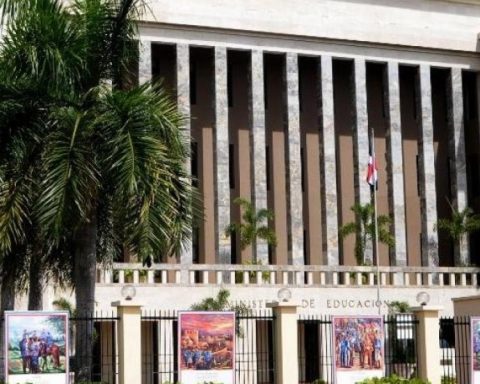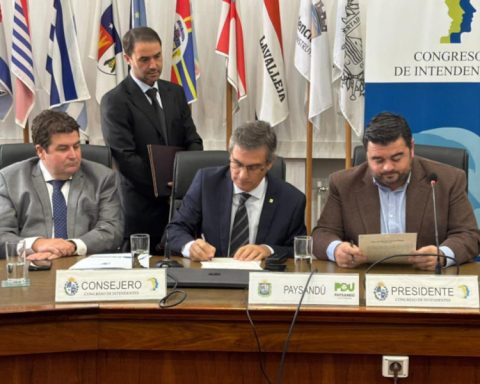The repercussions continue due to the boisterous agreement of reforms to the proposal for a new Constitution signed this Thursday by the presidents of the parties of both government coalitions. After the statements of the CP helmsman, Guillermo Tellier, regarding the fact that it cannot be guaranteed that these changes will materialize, a new blow to the ruling party came from the Comptroller’s Office, when this Friday he responded to a letter sent by DC deputies who objected to the role of the Minister of the General Secretariat of the Presidency (Segpres), Giorgio Jackson, as “articulator” of this agreement, establishing that with this fact, he was missing the presidency, ahead of the Plebiscite on September 4.
After the government spokesperson, Camila Vallejo, emphasized that this is not a lack of presidency, one of the participants in these conversations, the senator and president of the Democratic Revolution (RD), Juan Ignacio Latorre, said that “The Comptroller’s Office itself recognizes that Minister Jackson has acted with complete legality, he has always said that he is willing to receive proposals from all political forces, wherever they come from. We, the ruling parties, have already agreed in an exercise of unity and we deliver the proposals to the Government. I suspect that the Rejection has not been able to reach an agreement and send its proposals since they have nothing relevant to offer the country”.
Regarding the reasons why the ruling parties finally decide to agree on a reform agreement, the RD helmsman added that “President Boric was clear in pointing out that in case the Rejection wins, a new process should be urged Now, the question was still valid as to why it happens if the Approval wins, and obviously we have to prepare a roadmap for implementation and priorities and issues that must be clarified, and in that, this proposal from the ruling parties helps in that direction. This document seeks that the citizens can approve with certainty”.
The senator for the Valparaíso region assured that the conversations within the ruling party had been taking place for a few weeks, where on the one hand Democratic Socialism “tried to include its Approval with surnames”, and in Approve Dignity – specifically in the Broad Front – they were for a logic of “Approve to implement”, emphasizing the mandate of laws of interpretative norms and legislative implementation, whose discussion will take place as of September 5 in Congress. In this sense, Latorre adds that behind this agreement, Chapter 11 of the new Constitution is being considered, which establishes a series of mechanisms to reform the Constitution itself, “where there is legislative initiative, presidential initiative, popular initiative – with certain quorums , of 4/7 plus plebiscite on substantive reforms-“. In other words, the parliamentarian defends the idea that it is a “flexible text”.
Regarding the complex negotiations that finally came together in the agreement signed this Thursday, the president of the DR assured that there were moments of tension, such as, for example, that “I approve Dignity did not want to touch the political system, but there was pressure from some senators, warning that, if that was not included, the agreement would not finally be signed”. In this regard, he added that “the parties are not monolithic within”, and that in the discussion process “not all Democratic Socialism was square with all its proposals, there were nuances within that coalition, and the same thing happened in Approve Dignidad” .
In addition, specifically regarding the powers of the Chamber of Regions – one of the most complex points of the internal discussion and which was resisted until the end by the Broad Front and the PC – Latorre adds that “there have been senators from different sectors who have pointed out that they do not like the change and that they are about to replace the Senate, and there has been pressure in that direction. Now, by the way, there were sectors that said that more powers had to be included, but in no case was it the point that endangered the negotiation”.
The detail of the tense debate over the official agreement
Regarding the development of the conversations between the different political tents of Approve Dignidad and Socialismo Democrático, the only representative senator of the Broad Front assures that “there were moments of tension and distance, also considering that we were urgent to reach an agreement soon, and that It is a discussion that is between political leaders, about issues that often do not matter much to citizens, and that occur precisely in the final stretch of the campaign.
Precisely, regarding the concerns that arise around the balance of the new political system that is part of the constitutional proposal, Latorre specifies that in case of winning the Approval, it will only be implemented in 2026, with the dissolution of the current Congress. . In this sense, the president of the DR recalls that there were negotiations regarding the eventual attributions of the Chamber of the Regions – which would replace the current Senate – and that with this agreement agreed upon by all the ruling parties, a commitment is signed to carry out an analysis regarding the entire political system, including these new bodies and the constituted powers. “It is a discussion for which we have time, where all the parties have the right to present their reform proposals, and we will see in due course.”
But not only matters related to the political system were part of the noisy official negotiations. As detailed by the senator for the Valparaíso region, “there were red lines on the part of both coalitions”, with moments of tension, but where they finally managed to reach a consensus. Of course, Latorre warns that the political system was not the only key issue within this agreement: “There were other issues that were not included, such as the issue of abortion, where some sectors were in favor of including it among the reforms, and others They said that this was a discussion that had to be given with the feminist movement, and the parties not arrogate that decision to us, where we are mostly men. That was left out, but it was one of the topics of discussion.”
Finally, on the complex process that would come after September 5, with a hypothetical victory of the Approval, the RD helmsman believes that “the implementation of the new Constitution implies a paradigm shift and a new transformative governance.” In addition, and dismissing structural differences between the two ruling coalitions, which put the governability of the Executive in check, the parliamentarian assures that “our adversary is the right, and we must question them. Understanding that they frighten people, misinform them, with the aim of defend a model Constitution inherited from the dictatorship, and they do not want substantive changes. The right is hidden in this campaign, because apparently the faces of the Rejection are the former concertacionistas who are for that option, and the figures on the right-such as Sebastián Piñera or José Antonio Kast- try to be as hidden as possible. That is our real adversary, and we know that they seek to generate fear and confusion among citizens, with the aim of postponing the social crisis that precisely gave rise to this process.”


















